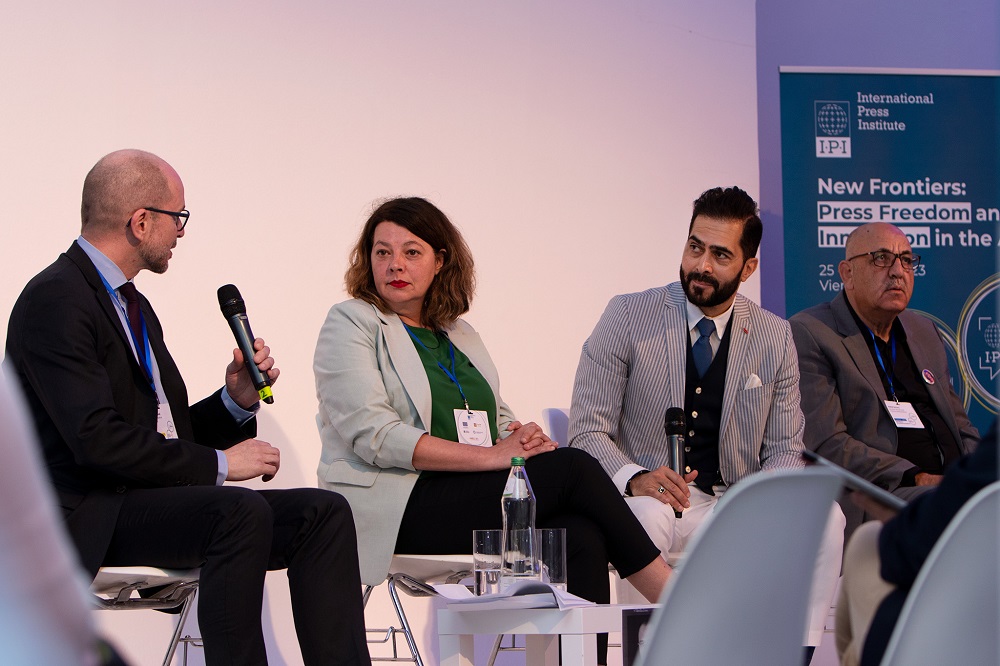Justice for killed journalists means holding the perpetrators to account. But how, when, and if these cases are resolved illuminates deeper trends within societies, panelists agreed during a Thursday afternoon session of the 2023 IPI World Congress and Media Innovation Festival. The session was moderated by Sami Zeidan, principal presenter at Al Jazeera Media Network.
One of the most high-profile, recent examples of impunity in the case of a killed journalist is the 2022 killing of Shireen Abu Akleh, a Palestinian-American Al Jazeera journalist and an IPI World Press Freedom Hero. Abu Akleh was shot and killed on May 11, 2022 by an Israeli soldier while reporting on an Israeli raid in the West Bank city of Jenin. Despite finally admitting in September that Abu Akleh had likely been accidentally killed by Israeli forces, Israel still has not opened a criminal investigation into her death, and no one has been held accountable.
Legal action on Abu Akleh’s killing has also stalled at the international level, explained panelist Walid Omary, who is Al Jazeera’s bureau chief in Palestine. “We [Al Jazeera] are approaching seven months since we submitted the case to the International Criminal Court,” Omary said. As of the time of the conference, he said he and his colleagues are still waiting for an update from the court’s chief prosecutor, Karim Ahmad Khan. He said continued stalling from the chief prosecutor of the world’s highest criminal court “betrays the credibility of the position he holds…I am worried because the double standards in this world are huge.”
While Abu Akleh’s case has continued to make headlines, it is far from the only case around the world where justice has been delayed. Panelist Ivana Stevanović, the executive director of Serbia’s Slavko Ćuruvija Foundation raised another, much older case that is only now seeing its day in court. Slavko Ćuruvija, a Serbian journalist critical of the Milošević government was murdered in 1999. Twenty-four years later, prosecutors are finally in the last stages of the retrial of his killers, who were originally convicted years ago, but saw their verdicts overturned by appeals courts.
Stevanović pointed out that the conclusion of Slavko Ćuruvija’s case will go well beyond achieving justice for one journalist or one family. Rather, she said, the verdict “will really be a crossroads for the whole of Serbian society.” “It is now a paradigm case for the whole overall rule of law in Serbia.”
WATCH THE RECORDING HERE
For panelist Jürgen Heissel of the OSCE Office of the Representative on Freedom of the Media, solving cases of impunity matters not only for the safety of journalists reporting on sensitive issues such as organized crime, corruption, and political scandals, but also for the overall stability of the affected states. Heissel emphasized “how important it is that we really solve those cases in a sustainable manner and not only on the surface, because if those issues remain, they will have repercussions for the future of the countries.”
So what does it take to win the battle against impunity? Panelists highlighted the importance of promoting public awareness, international pressure, and framing. By placing crimes against journalists in a larger context of the future of democracy and pointing out the reputational and even economic costs that come with creating a hostile environment for the media, international advocacy organizations can increase pressure on governments implicated or complicit in the killings of journalists.
Proactive work that addresses root causes is also key to preventing impunity cases before they happen. By identifying patterns and indicators within political climates that allow for the demonization of journalists online, organizations like the OSCE hope to be able to “identify those cases that might escalate and lead to offline violence,” Heissel said, and provide journalists with much-needed support.
Revisit the IPI World Congress & Media Innovation Festival 2023